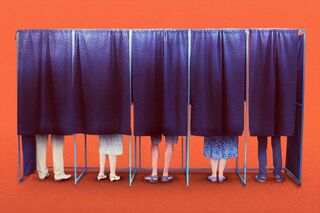Stress
How to Cope With Election Stress
Nonpartisan, practical tips for relieving stress about the upcoming election.
Posted September 23, 2020 Reviewed by Jessica Schrader

This post aims to be nonpartisan. Whether you’re a Democrat, Republican, or Independent, I hope it’s useful.
If the election is stressing you out, try using one or two of these tips to help you cope.
1. Make a specific plan for when and where you’ll vote. Unmade decisions stress people out. This year you may be considering different options for how you’ll vote (e.g., in person or by mail) than you normally would. Having a lot of options is a double-edged sword. It can provide flexibility, but adding more choice increases the mental work of choosing. Many people already feel decision fatigue, and another decision (especially if it involves wading through unfamiliar options) can feel burdensome.
If you’re anxious or a perfectionist, you may be particularly struggling with fear about your vote being counted, and wondering if there is a way to vote that’s more perfect than the other choices, to ensure your view counts.
If you make a specific plan for when and where you’ll vote, it will increase your likelihood of following through, and relieve your decision making stress. Be very specific, e.g., time, date, who you will vote with, and how you’ll fit it into your routine for that day.
2. If you feel inclined to volunteer, choose the easiest option. If you feel strongly about the election, you might feel like only voting isn’t enough, and want to volunteer to support your candidate. If you’re already feeling overwhelmed with your life, work, parenting, finances, relationships, etc, then you probably feel some tension about wanting to volunteer, which would add more to your plate.
Again, decision fatigue and needing to decide how to volunteer creates a barrier to action.
Identify the absolute easiest form that supporting your candidate, beyond your vote, could take. Implement that. Only then consider other ways. Once you’ve taken one action, you’re more likely to take another. If you overthink the options and everything you could do, you might feel decision paralysis.
3. Acknowledge any ambivalence you feel. For example, I’d like to have a yard sign, but I also don’t want to alienate my family from neighbors who have a different view. We have good relationships with our neighbors, and I don’t want to sour any of them.
When you acknowledge ambivalence, it can take the edge off it, and help prevent you from ruminating over what’s relatively minor in the grand scheme of things.
4. Stay close to people you disagree with. Some fear over the election is that the country will descend into further divisiveness. You can personally counteract this by maintaining close relationships with those you disagree with. Avoidance increases anxiety. Therefore, your anxiety will probably increase if you, say, avoid neighbors sporting the other candidate’s bumper sticker. Stay friendly. Or, at least test out how it feels to do that.
None of us are one-dimensional. We're all more human than we are one tribe or another.
5. Notice if you’re mentally replaying 2016. If you felt traumatized by the 2016 election, the upcoming election is probably causing you to mentally replay those memories and emotions. If you’re a Democrat, you might’ve felt shocked and abhorred with the result. If you’re a Republican, you might’ve felt vilified for your choice.
Rather than attempting to brush away the memories and emotions, try pausing and talking to yourself compassionately.
If you need more than that, spend 20 minutes writing about what you experienced in 2016 and your emotions, plus a self-compassionate response. Repeat this for 4-5 days. This writing procedure can help you emotionally process a difficult experience so that the memories are less intrusive.
6. Plan an enjoyable event for after election day. If you're very focused on the election, it might be all you can think about. Try planning an event you'll look forward to within the week or two after Election Day. Whatever happens on Election Day (plus however long it takes to count the votes), life will go on. Planning an enjoyable event will help reinforce that notion. Due to COVID, your options will be more limited, but you can still make the most of the fall weather.
7. Consider how you want to spend election night. If the election is really stressing you out, you might feel like you need some support to get through election night. What form would you like that to take? Plan ahead so you can get the support you need, even if that's virtual. You can even think through how you don't want to cope e.g., getting into disagreements on Twitter or with relatives, or drinking too much.
If you have a therapist, don't feel scared to talk to them about your election stress. Any good therapist should be able to support you and help you manage your thoughts and feelings regardless of their personal beliefs. And, it's not necessary to know your therapist's politics to know whether you can rely on them for support. You should be able to regardless. If you're hesitant, give them a heads up that you'd like to talk about the topic, and check they're comfortable with that. (They should be, but it never hurts to be polite and ask first.)
To find a therapist, please visit the Psychology Today Therapy Directory.




